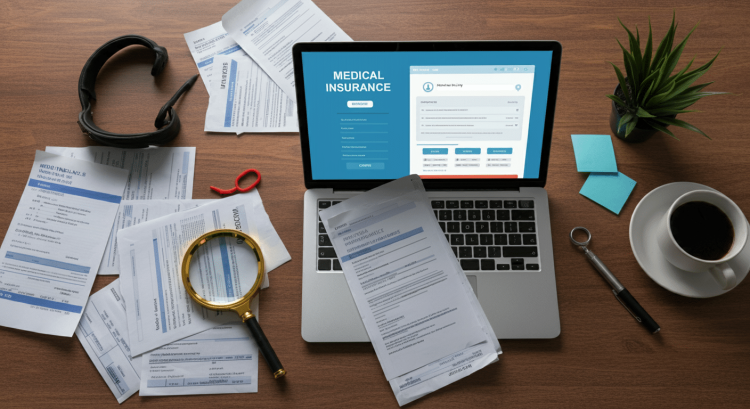Steering through medical insurance claims can feel overwhelming, but there are ways to make it manageable. Start by understanding your policy thoroughly; knowing what’s covered and what isn’t can save you from unexpected surprises. Maintaining accurate records of your medical visits and expenses is essential—think of it as setting the foundation for a smoother process. Timeliness in submitting claims is another key factor, as it helps avoid unnecessary denials. But what do you do if a claim is denied? And how do you guarantee effective communication with insurers? These questions might just change the way you approach your next claim.
Understand Your Policy
To effectively navigate your medical insurance claims, it’s vital to fully understand your policy. Start by thoroughly reading your health insurance documentation to pinpoint the coverage limits, exclusions, and benefits tied to various services. Awareness of these details helps you anticipate what medical expenses you’ll be responsible for, reducing surprises during the claims process.
Pay close attention to key terms such as deductible, copayment, and out-of-pocket maximum. These terms define your financial responsibilities, impacting how much you’ll pay before insurance kicks in. Understanding them guarantees you’re prepared for the costs you might face.
Pre-authorization is important for certain treatments and procedures. Without it, you risk claim denials, leaving you with unexpected expenses. Always check if pre-authorization is needed before proceeding with medical services.
Regularly review your policy for updates that might affect your coverage. Changes can impact your claims process and out-of-pocket costs.
Keep a list of in-network providers too, as out-of-network services can inflate your expenses considerably.
Keep Accurate Records
Having a solid grasp of your policy is the first step, but maintaining accurate records is equally important in managing your medical insurance claims effectively. Start by setting up a dedicated file or digital folder for all your medical bills, receipts, and insurance documents. This guarantees easy access and organization, essential for the claims process.
Document every medical visit, noting the date, services provided, and any correspondence with healthcare providers or insurers. It’s important to keep a record of all Explanation of Benefits (EOB) statements you receive. These documents detail your coverage and out-of-pocket costs, playing a significant role in understanding the insurance claims process.
Using a spreadsheet or an app, track your medical expenses thoroughly: log dates of service, amounts billed, and payments made. This gives you a clear overview of your healthcare costs and assures you’re getting the coverage you deserve.
Retain copies of all submitted claims and supporting documentation for at least five years. This practice is invaluable if disputes or audits arise, allowing you to provide proof of your claims and the documentation required.
Keeping accurate records empowers you to manage medical claims efficiently.
Submit Claims Promptly
Efficiency is key when it comes to submitting your medical insurance claims promptly. To begin, you should be aware that many insurance companies impose strict deadlines for filing a health insurance claim, often between 30 and 90 days from the service date.
Timely claim submission is crucial because any delay could lead to automatic denials, leaving you to face the full financial burden of your medical expenses.
To avoid this, consider using a calendar or reminder system to keep track of these deadlines. This simple step helps guarantee your claims are submitted within the required timeframes, reducing stress and safeguarding your finances.
Additionally, submitting claims as early as possible accelerates the claims process, meaning your claim is processed quicker, and you receive faster reimbursement for any out-of-pocket costs.
When you submit claims promptly, make sure to include all necessary documentation. This might include medical bills, receipts, and any required forms from your healthcare provider.
Having everything ready at the time of submission streamlines the process and prevents unnecessary delays. By adhering to these practices, you can effectively manage your medical claims and minimize potential financial setbacks.
Handle Denials Effectively
Handling a denial from your insurance company can be frustrating, but understanding the reason behind it is the first step to resolving the issue. Begin by reviewing the Explanation of Benefits (EOB) to determine why your medical claim was denied. This document will outline the services provided and the specific reasons for the denial.
Once you’ve identified the cause, gather all necessary documentation, such as medical records, bills, and any previous correspondence with your insurer. These documents are essential for supporting your case during the appeals process.
Familiarize yourself with your health insurance policy’s appeal timelines, as most insurers require appeals to be submitted within a specific timeframe, typically between 30 to 180 days from the denial notice. Don’t delay, as missing this window can jeopardize your chances of overturning the denial.
Reach out to your medical provider’s office for additional information or documentation that could bolster your appeal.
Keep detailed records of all communications with the insurance company, noting dates, representatives’ names, and discussion points. This meticulous documentation is invaluable if further action becomes necessary.
Communicate With Insurers
After understanding how to handle denials effectively, it’s important to focus on maintaining open communication with your insurer.
Establish clear lines by using designated customer service numbers or online portals for inquiries about health claims status or policy details. Always keep a meticulous record of interactions, noting dates, times, representative names, and conversation summaries. This guarantees you can accurately track the claims process and address any discrepancies swiftly.
When discussing a specific claim, articulate your concerns clearly. Provide details about the claim form, mentioning any additional documentation or medical necessity that supports your case. This level of detail facilitates prompt assistance.
Regularly review your Explanation of Benefits (EOB) to catch errors or misunderstandings early.
Be proactive by following up on claims submissions, ideally within a week. Confirm receipt and inquire if any additional information is needed to process your claim efficiently.
Utilize available resources, such as FAQs or guides, to familiarize yourself with the insurer’s procedures and typical issues. This preparation equips you for effective communication, making the claims process smoother and guaranteeing your health needs are met without unnecessary delays.
Conclusion
Steering through medical insurance claims doesn’t have to be intimidating if you’re well-prepared. By thoroughly understanding your policy, you’ll know exactly what’s covered. Keep meticulous records of your medical visits and expenses to support your claims. Don’t delay in submitting claims to avoid missing deadlines. If you face a denial, review your Explanation of Benefits and gather necessary documents for an appeal. Finally, communicate openly with your insurer, documenting every interaction to guarantee clarity and accuracy.



